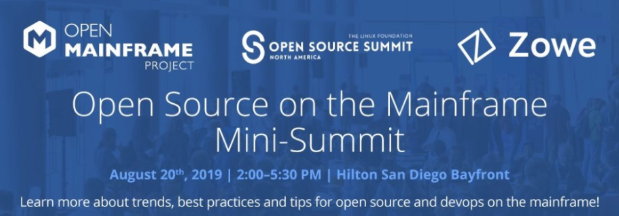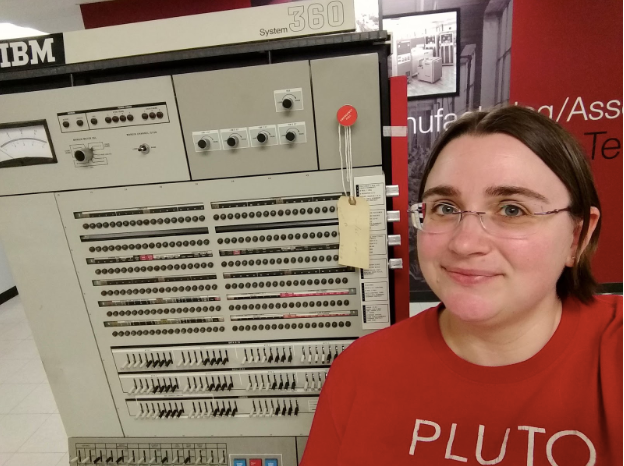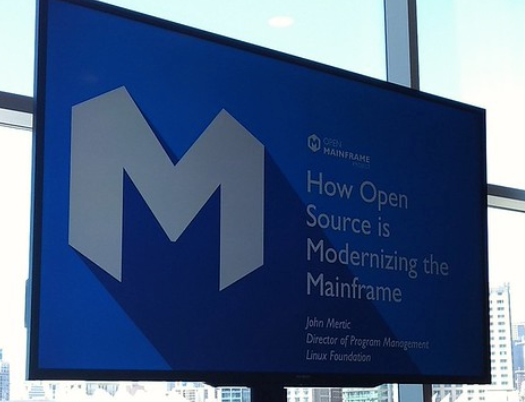By Elizabeth K. Joseph, Developer Advocate, IBM

On August 20th I spent an afternoon with several of my newest mainframe friends at the Open Source on the Mainframe Mini-Summit in San Diego.
I joined IBM in April as a Developer Advocate with a decade and a half of primarily x86 Linux systems administration experience and nearly two decades in open source communities. My focus in the 4 months prior to the summit had been getting up to speed with Linux on Z. This event was my first serious glimpse into the z/OS side of things. As a long-time open source contributor and advocate, getting my z/OS feet wet with the open source side was a good fit for me.

The event kicked off with a talk by John Mertic of The Linux Foundation who gave some background into the open mainframe space. He began by re-iterating the importance of the mainframe today, but the really valuable part of this presentation for me was his quick overview of projects. He also re-enforced my own observations of the general infrastructure ecosystem where agile and DevOps practices are key to operations, and drove home the need for this tooling to be open source. Slides from his talk are published on SlideShare, here: How Open Source is Modernizing the Mainframe.

More pictures here: https://www.flickr.com/photos/pleia2/48618614506/
About half of the event was then pretty firmly focused on Zowe, with talks from John Winchester (IBM) and Thomas Mcquitty (Broadcom) that spoke to how Zowe is changing the landscape for new developers. I had heard of Zowe, but being new to the z/OS space entirely I didn’t fully understand the problem it was trying to solve until this event. Having poked around at Master the Mainframe student challenges, I know enough to understand that interactions with mainframes are often… archaic. In spite of it not actually being inherently difficult, Linux systems administrators like myself, who grew up on being able to use open source tooling and flexible automation tooling, are left bewildered by the green on black screens[1] and custom, often proprietary, tooling. We want tooling that meshes well with the rest of our infrastructure, including scripting capabilities via modern CLIs and APIs. This is particularly important in a world of hybrid computing, where organizations are using a mix of clouds and on-premises mainframes. Zowe provides just that, with an API, CLI, and a web user interface.
The event concluded with lightning talks. One was around the announcement of the Feilong project that was also made the week of the summit. Feilong is a new open source z/VM cloud connector being developed under the Open Mainframe Project which seeks to specifically address interactions with z/VM, including the ability to provision, manage, and destroy guests through modern APIs and SDKs.
A couple things that piqued my interest from the Linux side. First was learning about the Anomaly Detection Engine for Linux Logs (ADE) project, which detects anomalous time slices and messages in Linux logs on Z. The second was a talk from Jeff Reser of SUSE, who quickly walked us through the history of SUSE on the mainframe, the first still commercially available distribution to have an official port for s390x, and where they’re looking right now, including support for Kubernetes and Cloud Foundry.
As a newcomer to this space, I learned a lot in the handful of hours I spent with the group at the summit. It was really nice to have some focused time to learn about the current projects and where things are going in the future, and put some faces to names. In October I’ll be speaking at Silicon Valley Code Camp on Developing for the Modern Mainframe. Originally I had planned on this talk to focus on the Linux side of things, but with my new found awareness of Zowe and Feilong I updated my talk to cover z/OS tooling that may be of interest to developers too. So if you’re in San Jose the weekend of October 19-20th and are interested in coming by for my talk, registration is still open and I’d love to meet up and chat mainframes.
[1] If I’m honest, the green on black screens are novel in a retro way that I actually kind of enjoy, I’m old enough that my first computer was an IBM 8086 as a kid, but I’m not sure I’d ultimately feel that way if I was using them every day.